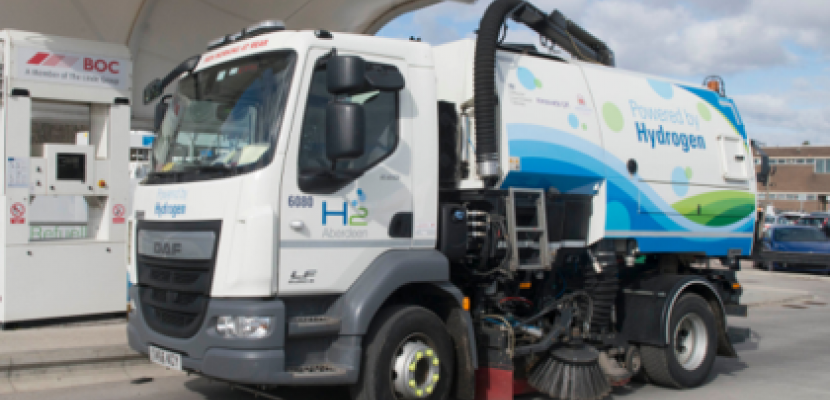Image

Hydrogen Trucks in Aberdeen City
Published on 14 January 2022

United Kingdom
North Eastern Scotland
This is the good practice's implementation level. It can be national, regional or local.
About this good practice
Aberdeen City Council (ACC) has deployed 5 retrofitted trucks within its public sector fleet. All 5 trucks are H2ICED (hydrogen with internal combustion engine) – this is a hybrid solution comprising a diesel truck with hydrogen injection. The truck therefore uses both diesel and hydrogen fuels. It is a bridging technology that provides a good compromise in lieu of other zero carbon alternatives.
Bridging technology provides best value for money to reduce carbon emissions, establishes learning on real life conditions through use of hydrogen technology and it helps raise demand for hydrogen in Aberdeen without complete reliance on it. Other benefits include no range anxiety because the trucks use both diesel and hydrogen.
ACC has 3 diesel-hydrogen DAF road sweepers and 2 diesel-hydrogen waste trucks.
The main stakeholders are ACC Waste Management team plus drivers, ACC Fleet team plus technicians, ULEMCo (dual-fuel vehicle converter), Councillors (decision-makers for projects to proceed) and the hydrogen refuelling providers (ACC and BOC). Retrofitting of the trucks was funded by Intereg North Sea Region HyTrEc2 project, Office for Low Emission Vehicles and Innovate UK, Scottish Government and Green Growth Accelerator.
Following success of the 5 retrofitted trucks, ACC plans to retrofit 1 roadsweeper and 42 waste trucks over the next five-year period. 1 fuel cell waste truck has been procured through the Intereg North West Hector project. This will be deployed in 2022.
Bridging technology provides best value for money to reduce carbon emissions, establishes learning on real life conditions through use of hydrogen technology and it helps raise demand for hydrogen in Aberdeen without complete reliance on it. Other benefits include no range anxiety because the trucks use both diesel and hydrogen.
ACC has 3 diesel-hydrogen DAF road sweepers and 2 diesel-hydrogen waste trucks.
The main stakeholders are ACC Waste Management team plus drivers, ACC Fleet team plus technicians, ULEMCo (dual-fuel vehicle converter), Councillors (decision-makers for projects to proceed) and the hydrogen refuelling providers (ACC and BOC). Retrofitting of the trucks was funded by Intereg North Sea Region HyTrEc2 project, Office for Low Emission Vehicles and Innovate UK, Scottish Government and Green Growth Accelerator.
Following success of the 5 retrofitted trucks, ACC plans to retrofit 1 roadsweeper and 42 waste trucks over the next five-year period. 1 fuel cell waste truck has been procured through the Intereg North West Hector project. This will be deployed in 2022.
Resources needed
Tenders were issued for the retrofitting of the trucks to appoint ULEMCo as the technology provider.
Evidence of success
Aberdeen has 2 types of retrofitted roadsweepers: two with a 74 litre (1.5kg) hydrogen tank which has resulted in 30% carbon dioxide savings, and one with a 74 litre and 204 litre (4.8kg) hydrogen tank which has resulted in 40-50% carbon dioxide savings. The roadsweeper has a range of 50km. The 2 dual-fuel waste trucks each have two 9.6kg (205 litre) hydrogen tanks with a range of 180km. Refuelling of both the roadsweepers and the waste trucks takes approximately 8 minutes at 350bar pressure.
Potential for learning or transfer
It is possible to implement hydrogen technology at pilot stage and then at a larger scale. The practice shows the importance of trialling technology first before implementing it at a larger scale. Incorporating dual-fuel technology in ACC’s fleet has brought training opportunities for ACC drivers and technicians as they use hydrogen technology. This will make it easier to pursue a larger scale conversion of more waste trucks. The bulk conversion that ACC intends to pursue will also result in economies of scale and therefore a reduced cost than converting one vehicle at a time.
The practice also highlights the importance that funding from local, national and international bodies plays when it comes to trialling and pursuing hydrogen technology.
The practice also highlights the importance that funding from local, national and international bodies plays when it comes to trialling and pursuing hydrogen technology.
Further information
Website
Good practice owner
You can contact the good practice owner below for more detailed information.
Organisation
Aberdeen City Council

United Kingdom
North Eastern Scotland
Contact
Project Officer
